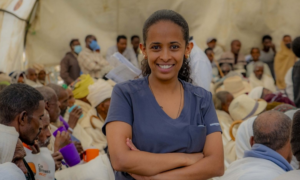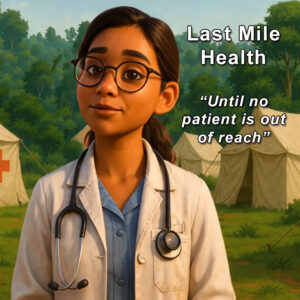Dr. Blake Marleau Snyder recently performed 800 cataract surgeries in Ethiopia with the Cure Blindness Project, a global effort to eliminate preventable blindness through a rapid, cost-effective procedure.
Dr. Blake Marleau Snyder recently returned to Colorado after performing hundreds of sight-restoring surgeries in Ethiopia, though his stay will be brief. He plans to return abroad in November to continue his work with the Cure Blindness Project, a global nonprofit organization dedicated to eliminating preventable blindness.
Working alongside Dr. Geoff Tabin of Stanford University, Dr. Snyder employs a surgical technique developed by Nepalese ophthalmologist Sanduk Ruit. The procedure removes cataracts and replaces damaged eye lenses with acrylic ones in minutes, without requiring stitches or general anesthesia.
In late August alone, his team completed 800 surgeries in Ethiopia. “A person that had been blind for seven years that we did surgery on in Ethiopia hadn’t seen her granddaughter,” Dr. Snyder told the Aspen Times. “[She was able to] see the next day when we removed her patch and was able to see her granddaughter for the first time.”
The work addresses a significant global health challenge. Cataracts, a clouding of the eye lens that typically develops with age, are more prevalent in regions with limited medical access and nutritional deficiencies. Left untreated, they can progress until patients cannot perceive even the number of fingers held before their eyes.
Despite the procedure’s cost-effectiveness — Dr. Snyder notes the surgery costs less than what patients typically contribute back to the economy once their sight is restored — funding remains a challenge. The dissolution of USAID, which previously supported such efforts, has forced the Cure Blindness Project to rely primarily on private donations.
Dr. Snyder credits his upbringing in the Roaring Fork Valley, surrounded by active nonprofits, with shaping his commitment to global health work. He and his colleagues are now establishing hospitals and training local medical professionals to perform the surgeries, working to overcome language barriers and ensure the work continues independently.
This summary is based on the following article:
- Aspen’s own has an eye for change, by Colin Suszynski for The Aspen Times
Related Articles

Global Relief in Focus: 10 Images that Defined Humanitarian Aid in 2025
2025 was a year filled with conflict, disaster and disease—as well as the work of committed and courageous humanitarians who did everything they could to help. These photos from International Medical Corps highlight the people who made it happen.

From Residency to Impact: How Cure Blindness Project Empowered My Mission
At Cure Blindness Project, our work is defined by the dedicated clinicians who carry sight-saving care forward in their own communities. We’re honored to share the story of Dr. Abeba Tesfay of Quiha Hospital in Ethiopia—an inspiring ophthalmologist whose journey reflects the resilience, partnership, and long-term impact that strengthen eye care systems even in the most challenging circumstances. Her reflections illuminate how training, mentorship, and sustained collaboration can empower providers to rebuild, innovate, and expand access to quality eye care for all.

Last Mile Health: Bringing Healthcare to the Most Remote Communities
Last Mile Health transforms healthcare delivery in remote communities by training and paying local health workers, ensuring no patient is out of reach in Liberia, Ethiopia, Malawi, and Sierra Leone.


